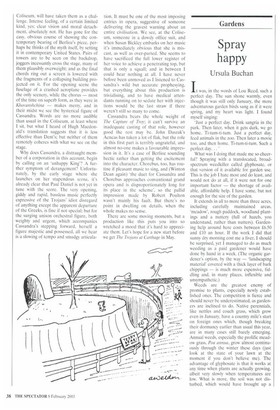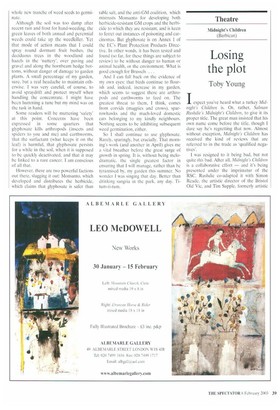Spray happy
Ursula Buchan
It was, in the words of Lou Reed, such a perfect day. The sun shone warmly, even though it was still only January, the more adventurous garden birds sang as if it were spring, and my heart was light. I found myself singing:
'Just a perfect day. Drink sangria in the park. Then later, when it gets dark, we go home. Ti-turn-ti-turn. Just a perfect day, feed animals in the zoo. Then later a movie too, and then home. Ti-turn-ti-turn. Such a perfect day. .. '
What was I doing that made me so cheerful? Spraying with a translocated, broadspectrum weedkiller called glyphosate, or that version of it available for garden use. This is the job I hate most and do least, and would not do at all, if it were not for one important factor — the shortage of available, affordable help. I have some, but not enough for the size of the garden.
It extends in all to more than three acres, including carefully maintained areas. 'meadow', rough paddock, woodland plantings and a fluttery (full of hazels, you understand, rather than nutters). Gardening help around here costs between £6.50 and £10 an hour. If the work I did that sunny dry morning cost me a fiver, I should be surprised, yet I managed to do as much weeding as a paid gardener would have done by hand in a week. (The organic gardener's option, by the way — 'landscaping material' covered with a thick layer of bark chippings — is much more expensive, fiddling and, in many places, inflexible and unsympathetic.) Weeds are the greatest enemy of promise to plants, especially newly established ones. The competition is fierce and should never be underestimated, as gardeners are inclined to do. Native perennials, like nettles and couch grass, which grow even in January, have a country mile's start on foreign ones which, though breaking their dormancy earlier than usual this year, are in many cases still barely emerging. Annual weeds, especially the prolific meadow grass. Poa annua, grow almost continuously through the winter these days (just look at the state of your lawn at the moment if you don't believe me). The advantage of glyphosate is that it works at any time when plants are actually growing, albeit very slowly when temperatures are low. What is more, the soil was not disturbed, which would have brought up a whole new tranche of weed seeds to germinate.
Although the soil was too damp after recent rain and frost for hand-weeding, the green leaves of both annual and perennial weeds could take up the weedkiller. Yet that mode of action means that I could spray round dormant fruit bushes, the deciduous trees in the woodland and hazels in the `nuttery', over paving and gravel and along the hornbeam hedge bottoms, without danger of damage to garden plants. A small percentage of my garden, sure, but a real headache to maintain otherwise. I was very careful, of course, to avoid spraydrift and protect myself when handling the concentrate. I might have been humming a tune but my mind was on the task in hand.
Some readers will be muttering 'safety' at this point. Concerns have been expressed in some quarters that glyphosate kills arthropods (insects and spiders to you and me) and earthworms, that the surfactant (what keeps it on the leaf) is harmful, that glyphosate persists for a while in the soil, when it is supposed to be quickly deactivated, and that it may be linked to a rare cancer. I am conscious of all that.
However, there are two powerful factions out there, slugging it out: Monsanto, which developed and distributes the herbicide, which claims that glyphosate is safer than table salt, and the anti-GM coalition, which mistrusts Monsanto for developing both herbicide-resistant GM crops and the herbicide to which they are resistant, and is keen to ferret out instances of poisoning and carcinomas. But glyphosate is on Annex 1 of the EC's Plant Protection Products Directive. In other words, it has been tested and found (so far, for these things are subject to review) to be without danger to human or animal health, or the environment. What is good enough for Brussels . . .
And I can fall hack on the evidence of my own eyes: that birds continue to flourish and. indeed, increase in my garden, which seems to suggest there are arthropods and earthworms to feed on. The greatest threat to them, I think, comes from corvids (magpies and crows), sparrowhawks and the much-loved domestic cats belonging to my kindly neighbours. Nothing seems to be inhibiting subsequent weed germination, either.
So I shall continue to use glyphosate. Rarely, sparingly, but crucially. That morning's work (and another in April) gives me a vital breather before the great surge of growth in spring. It is, without being melodramatic, the single greatest factor in ensuring that I will manage, rather than be tyrannised by, my garden this summer. No wonder I was singing that day. Better than drinking sangria in the park, any day. Titurn-ti-turn.



























































 Previous page
Previous page